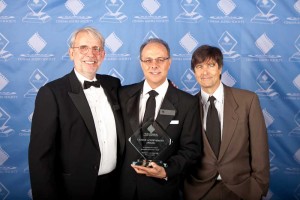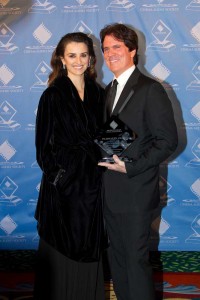
It is said that sound is at least 50% of a cinema experience. And though the vast majority of individual and collective awards given out this season concern the look of a film, from costume and makeup to production design and cinematography, the Cinema Audio Society awards on Feb. 18 at the Biltmore Hotel in Los Angeles demonstrated why. For a movie without triumphant sound, even considering the singular achievements of a film like The Artist, is not really a movie at all.
Although the CAS combines their awards amongst both production sound mixing and postproduction re-recording mixing, as the CAS presented their craft, sound ultimately rears its head as two entirely different animals. Surely, the on-set sound mixers must contend with the turmoil of noisy locations, the mobility of getting good material within crowded soundstages, and the utter chaos of dealing with multiple sound sources on big-ticket films. In contrast, the sound effects editing tasks in a controlled re-recording studio offer not only due freedom and comfort but a supremely protected setting in which to create the final version of a film’s mix.
In fact, if there is one quibble with the CAS Awards, it might be why the categories are not subdivided into separate awards for on-set sound work and in-studio postproduction efforts. Perhaps the answer lies in the fact that it is often nearly impossible to determine whether, for example, an actor’s dialogue in a finished film was actually recorded on set or in an ADR session in post. As such, the CAS solved any sense of confusion over the origins and final output of sound in films by merging the two wholly unlike aspects of working with sound in films during its ceremony. This is most unlike the Academy Awards, which offers separate awards for sound mixing and sound editing and likely does confuse even cinephiles, to say nothing of the general populace, when it comes to which group actually produced the sounds that are heard in movies. For example, how was it determined by the Academy that Moneyball should be nominated for an Oscar for sound mixing but not sound editing while Drive should be nominated for sound editing but not sound mixing? The likely answer is “not easily” as three other films were in fact nominated in both categories.

In the CAS’s proceedings, the other major career-spanning award went to choreographer/director Rob Marshall whose work in musicals brought him to prominence. Marshall, who directed Chicago, Memoirs of a Geisha, and the newest Pirates of the Caribbean film, noted that he relies heavily on the craftsmanship of the many technicians on his sets, sound mixing being foremost among them. Notably, Marshall’s humble approach to heralding his co-workers on a film stands in stark contrast to other preeminent directors who need no name. Perhaps as Marshall began as one of them, choreographing work on stage and later directing, he has maintained an appreciation and respect for below-the-line artists. In addition to being regaled by several of the co-workers from his aforementioned films, Penelope Cruz gave a kindhearted introduction to Marshall, whose next directorial project is rumored to be a film version of the stage hit Into the Woods.
In the end, despite the big winner in films being Hugo for production mixing, re-recording mixing and score mixing, and three television programs (including Deadliest Catch, Too Big to Fail and Boardwalk Empire) having their sound artists honored in similar awards categories, one is ultimately left with a broader understanding of sound as a key element to the overall filmmaking process more so than remembering any individual triumphs in a particular production. One of the evening’s many jokes noted that the success of The Artist might point to a regression in sound being used in future films; however, the irony might be that it is the unique quality of that film that might awaken audiences to how crucial sound has been in their cinematic experiences for the past 80 years, and, in the end, newfound respect for sound and its vital craftspeople may finally emerge.
The winners of the Cinema Audio Society awards for outstanding achievement in sound mixing for 2011 are:
Motion Pictures
Hugo
Production Mixer: John Midgley
Re-recording Mixer: Tom Fleischman, CAS
Scoring Mixer: Simon Rhodes
Television Movies and Mini-Series
Too Big to Fail
Production Mixer: James J. Sabat, CAS
Re-recording Mixers: Chris Jenkins and Robert J. Beemer, CAS
Scoring Mixer: Chris Fogel
Television Series
Boardwalk Empire, “To The Lost”
Production Mixer: Franklin D. Stettner, CAS
Re-recording Mixers: Tom Fleischman, CAS
Television – Non-Fiction, Variety or Music – Series or Specials
Deadliest Catch, “New Blood”
Re-recording Mixer: Bob Bronow, CAS
The Winners for the Cinema Audio Society Technical Awards for 2011 are:
Production
Zaxcom Nomad Production Sound System
Postproduction:
Avid Pro Tools 10





